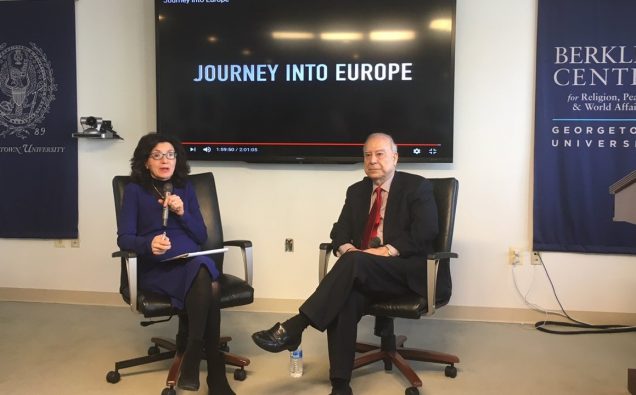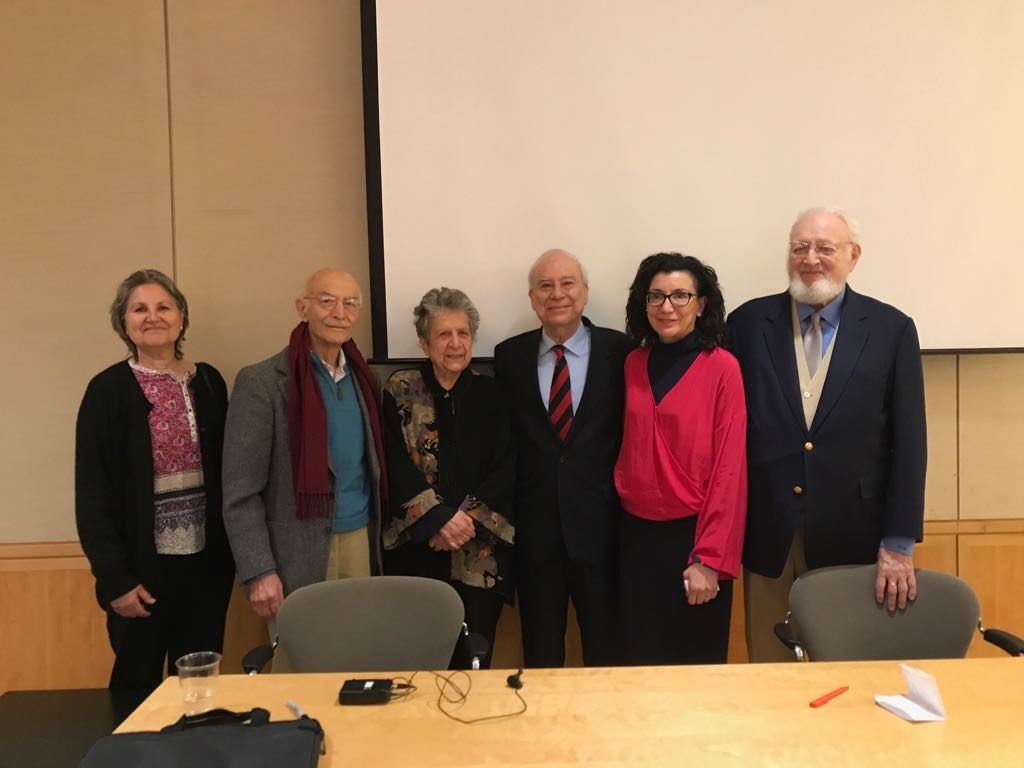
Author Prof. Jocelyne Cesari engages in dialogue with Ambassador Akbar Ahmed at Georgetown University on March 26, 2018.
In the eyes of most Europeans, Muslims have come to represent fanaticism, fundamentalism, and female suppression, subjugation and repression.
Antidote to such an alarming trend is the most recent book of Akbar Ahmed, Journey into Europe: Islam, Immigration, and Identity. It is an original and unique contribution to the expanding literature on Islam in Europe for several reasons.
First, as an anthropologist, Ahmed breaks away from the usual solitary work of the researcher consigning his observations into a notebook. Instead he works in team with young scholars of different ethnic and religious backgrounds who offer fresh and diverse perspectives on the situation at hand. Second, this team work is a great asset for presenting the diversity of Muslim voices in Europe, while most of the essays or scholarship on the topic tend to shed light on one particular group at a time.
In this book, the reader will discover a vast array of Muslim figures, from Sicily to Munich, from upper-class Muslims in Berlin to disenfranchised youth in Bradford, as well as a wide range of identifications to Islam, from secularism to conservatism.
The narrative weaves a vast tapestry made of all these different threads and provides a level of nuance quite unprecedented in academic publications. Third, Akbar Ahmed’s book has the unique advantage of presenting the positions of non-Muslim religious and political figures who are also part of this tapestry. It is quite unusual in such an investigation to also address the diversity of positions of the main protagonists with whom Muslims interact, from extreme-right political figures to civil servants and religious leaders of other communities.

From left, Zeenat Ahmed, Prof. Nur Yalman, Prof. Leila Ahmed, Ambassador Akbar Ahmed, Prof. Jocelyne Cesari, and Barry Hoffman, the Honorary Consul General of Pakistan in Boston, gather following Ambassador Ahmed’s lecture at Harvard University on April 13, 2018. Prof. Jocelyne Cesari moderated the lecture.
By restituting this polyphony of voices on all sides, this book is a unique and courageous attempt to display the diversity that challenges the simplicity of the current discourses and policies on Islam and Muslims in Europe. In this respect, the information gathered by Akbar Ahmed reveals that Islam is not per se the main factor in the building of Muslims’ social identities or in their political participation.
Instead, other elements—class and immigration background among them—have a decisive influence in ways that require further investigation. Conversely, Ahmed also describes parallel simplifications at work among some Muslims who depict Europe as the epitome of the oppressive, corrupt and decadent West. In this sense, Ahmed’s book indirectly shows that the clash is not between civilizations but between essentialized and inverted perceptions of Islam and Muslims that reinforce each other.
What could be done to break this vicious circle? Ahmed offers a very important suggestion to facilitate the recognition of Islam and Muslims in Europe – learning from Europe’s own past engagements with Muslim empires. He describes the rich historical encounters between Europe and Muslim empires, noting the cross-pollination of ideas as well as the mutual acceptance of Christians and Muslims which existed in some of these historical periods.
One cannot help to wonder: How can this past become relevant to today’s interactions between Muslims, secular people, Christians, Jews and other faiths in Europe?
It would require a change in the national narratives of each country to teach the new generations about these moments of past civility or convivencia in order to foster new ones and transform the “alien” Muslim into a recognized member of the European families.
It is a daunting task that requires intellectual and political courage. Can it be done?












